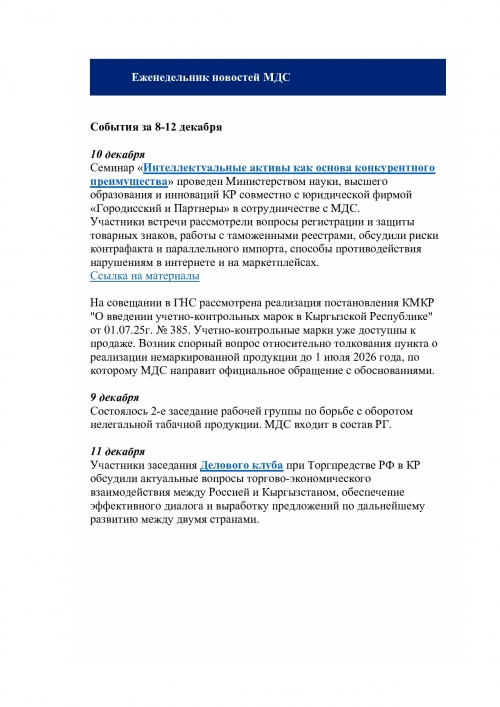Analysis /
Articles /
New manufacturing approach: Made with Italy in Kyrgyzstan
Project “Made with Italy in Kyrgyzstan” was recently submitted to the Ministry of Economy of Kyrgyzstan and the Kyrgyz Chamber of Commerce and Industry as well as business associations such as the International Business Council (IBC), Bishkek Business Club, and JIA Business Association. In addition, many private entrepreneurs participated in the presentation of a new approach of Italian manufacturers to produce Italian goods in Kyrgyzstan for further export to Russia, Central Asia and eventually to China.
“This is a medium and long term project that if adequately implemented can facilitate the development and startup of several new industries under a win-win scenario, the Italian Consulate in Kyrgyzstan said. “The proposed scheme may bring in to Kyrgyzstan technological know-how, advanced design and brands, qualified management and other forms of cooperation in addition to an established market relationship acquired by Italians through their long-term connection with Russian companies and buyers.”
According to Giorgio Fiacconi, TCA publisher, European sanctions on Russia and Russian counter sanctions on Europe, as well as new sanctions of Russia on Turkey, have forced European and Turkish manufacturers to find new ways to stay in the Russian market. A new model of export oriented cooperation between Russia and former Soviet States is now taking shape with the purpose to produce in Russia and in several Eurasian Economic Union (EEU) member countries. The new initiative “Made with Italy” is being promoted by the Italian Ministry of Economic Development as a new way of transferring technological know-how and other forms of cooperation to countries that enjoy the benefits of their membership of the EEU and are free from any form of sanctions.
“A survey has identified several sectors where the Kyrgyz may bring a considerable contribution of skills and raw materials, such as the garment industry, agro processing, production of furniture and building materials, and so on. The agro processing is certainly a key area of industrial cooperation, with the large production of Kyrgyz meat, milk, chickens, fruit and vegetables,” Fiacconi said.
The Russian-Kyrgyz Development Fund (RKDF) is now lending to local companies that can submit feasible projects for export to Russia. Also, the EBRD is eager to support the industrialization process and has reached agreement with several Kyrgyz banks. “The presence of well-established Italian companies with proven expertise and market know-how will certainly add a solid element of evaluation to the process of considering new financing,” TCA publisher believes.
Kyrgyzstan has the lowest taxes in the region but the lack of appropriate infrastructure hinders the establishment of new factories in the regions. “There is an urgent need to develop an industrial zone with factories of different size and to provide such new manufacturing facilities with easy transport access, electricity and water supply,” Fiacconi said. “To facilitate the project, the Government should be able to mobilize private and public funding in order to create a synergy for a faster and improved development allowing investors to look to the new venture with confidence and a reduced cost of entry.”
The Economy Ministry of Kyrgyzstan is drafting a new law to create additional incentives to attract investors and it is expected that certain requests of the local business community should be considered. According to Fiacconi, attention should also be given to establishing additional incentives for those companies that are prepared to localize their plants in underdeveloped oblasts such as Naryn, Jalal-Abad or Talas, or to companies that have a high local content in their products, such as agro processing industries. Special attention should also be paid to providing additional benefits to those companies that increase employment and are labor-intensive and export oriented.




























